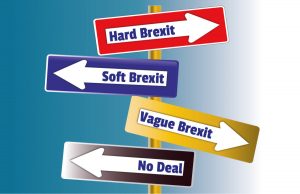
Regardless of one’s political views it is easy to see the current mire of Brexit is a classic example of how
not to manage change.
By failing at every level the process has become stuck in the mud regardless of whether you were a remainer or an ardent Brexiteer; confusion reigns supreme & it is difficult to see a way out of the mess without seriously ‘cheesing off’ large portions of the population.
According to John Kotter, a Professor at Harvard Business School there are 8
key steps to change:-
- Create Urgency: There needs to be a compelling case for change, and it’s up to the project leader to explain that reason clearly so people understand and are inspired to change.
- Form a Powerful Coalition: One person cannot shoulder the change themselves. It requires a team, so it’s important to collect the key people to help enable that change.
- Create a Vision for the Change: Make it short, clear, relevant and easy to understand by the people who are going to be affected by the change.
- Communicate the Vision: Communicate the change, but don’t just talk the talk. Walk the walk of the change and have it reflected throughout the project.
- Remove Obstacles: As you work towards implementing change, you will hit both physical and emotional obstacles, so you and the team need to help people overcome these blocks by listening to their concerns and seeking their feedback.
- Create Short-Term Wins: By demonstrating the benefits of the change early in the process you’re more likely to get buy-in and expedite the process overall.
- Build on the Change: Don’t think you’re done too early in the process. Instead, repeat the above steps for awhile and let the change settle in.
- Anchor the Change: Finally, make sure the change sticks by embedding it in the organizational procedures, operating models and people’s day-to-day work
So applying these key steps to Brexit:-
1) Create Urgency – why did Brexit have to be triggered so soon after the Referendum & without a clear definition of what the destination was. Given the current debate about what Brexit actually means this was never spelt out clearly or defined to a fine enough detail.
2) Form a Powerful coalition – This clearly did not happen. Theresa May is undoubtedly a Politician of fierce determination but lacks the ability to reach out & form alliances even in her own party. She has been thwarted at every turn because she never had the character to reach out to others across the political divide & form a consensus on what Brexit was & how to achieve it.
3) Create a vision for the change – it is still a matter of conjecture whether Brexit involves a customs union, agreed access to the common market, etc etc – ask 10 different people what Brexit is & you get 11 different answers.
4) Communicate the Vision – ‘Nuff said.
5) Remove Obstacles – it seems as if the longer the process staggers on the more obstacles are thrown in its way. This is a direct result of not having a clearly defined end goal & strategy.
6) Create short term wins – difficult to see any evidence of this.
7) Build on Change – yet to see this achieved.
8) Anchor the change – Ditto.
It is incredulous to believe that a major western Democratic Government has embarked on a Change of this magnitude without adopting the very basis tenets of Change Management.
chris@amberhill.biz
 Regardless of one’s political views it is easy to see the current mire of Brexit is a classic example of how not to manage change.
Regardless of one’s political views it is easy to see the current mire of Brexit is a classic example of how not to manage change.
